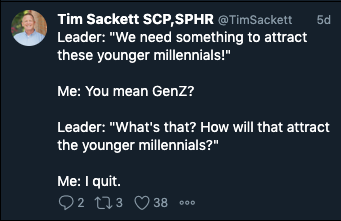If we’re honest, and we rarely are with ourselves, every older generation thinks every younger generation sucks. Not once in history did an older generation look down at the upcoming generation and think, “Yeah, they’ll be good!”
We don’t do this because it’s a bunch of experienced people looking at a bunch of inexperienced knuckleheads! They do dumb stuff. They say dumb stuff. They make mistakes. They don’t know the norms. They don’t know the customs. To top it off, they think this makes them unique and better. And we stand there shaking our heads and think, “We’re doomed!”
But that’s not even the reason they’re lazy!
The reason younger workers are lazy is hope.
Hope?!
Younger workers haven’t yet been beaten down to the reality that to make ends meet, they’ll be grinding out 40-50 hour weeks for the next 40+ years!
They still have hope that their TikTok or their YouTube channel is going to take off, and they’ll make 1 million dollars a month and fly private to Ibiza even though they have no idea where Ibiza is because they didn’t really pay attention to geography in school. After all, it interfered with their broken public education agenda.
They still have hope that somehow their parents or the government or some celebrity will somehow change the system so they can do “what they love” and make all the money in the world to do what they really love!
They still have hope that they’ll be just like their favorite social media personalities who have it so easy and just get to do cool stuff all day.
They still have hope that someone is going to tell them this “work” thing is all just one big joke: go back to bed and get up when you want. Don’t worry. The refrigerator will have plenty of food in it, and Daddy just upped the WIFI pipe again, so you can now download that next season directly into your brain.
Hope is the reason they are lazy.
We all had it.
We don’t remember the exact moment we lost it.
It was probably sometime into year 3-5 of working post-school when it hit you. I’ll be doing this forever. This is now what I am. Sure, you’ll still laugh and have fun. You’ll still find love and pain. You’ll have the weekends and vacations. And boy, what about that retirement!? YES! I can’t wait for retirement!
You become hopeful for retirement.
Every single younger generation sucked, and they were lazy. I was. You were. Your grandparents were when they were young.
Maybe some older generations were a bit more humble when they were younger. I mean, that’s when older generations would just smack you if you were dumb and lazy. Now, we sit them down and tell them how great they’ll be. Maybe it’s a mixed message. Ugh, we all still have some of that hope in us.
It’s a rude awakening to go from this nice little 20-30 hour a week schooling, where you only go about 180 days a year, to grasp the fact that you now have to work almost every day for almost double the time, for almost the rest of your life. No one really wants to come to grips with that. We can’t blame younger workers for not wanting that! It’s a really tough pill to swallow.
That’s why it’s so easy for a young worker who has given up on this ideal to win in today’s work world. If you show up and are just average, you stand out amongst your peers who are giving almost nothing but feeling like they’re giving everything. The faster you come to grips with that you’ll have to work and not suck, the quicker you get to win.
Hope is a mighty powerful drug!


